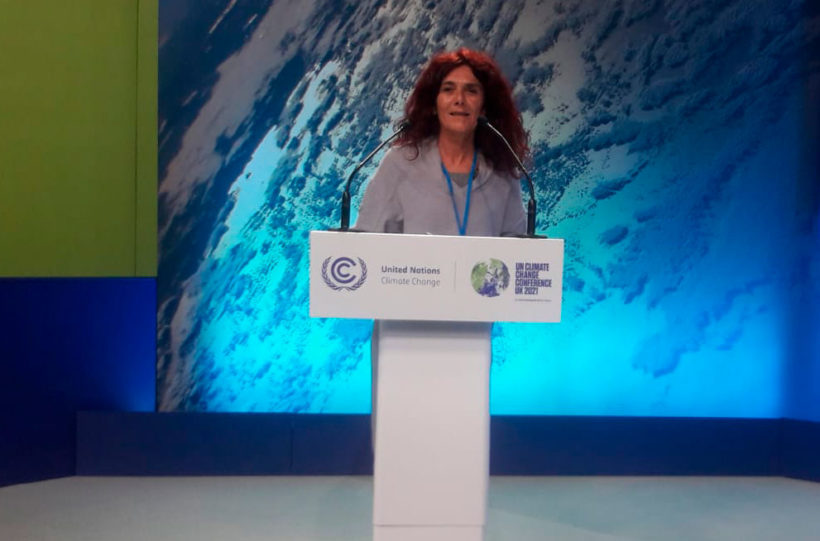We approached her by email with a question: How can the University contribute to the green movement beyond placing recycling bins in its facilities? And she answered us with a practical case: the ILP (Popular Legislative Initiative) that is now underway and that seeks to give legal personality to the Mar Menor lagoon and its basin arose in one of her classes.
We spoke to Teresa Vicente Giménez, Professor of Philosophy of Law and Director of the Chair of Human Rights and Rights of Nature at the University of Murcia. This professor embodies the ultimate relationship between the University and the Environment: since her time at university she has been linked to the environmental movement – her doctoral thesis was on “Justice and environmental law: for a model of ecological justice” -; today she is a speaker at the different editions of the COP (United Nations Climate Change Conference) and other international meetings on climate, she gives talks at universities and advises on environmental issues.
The ILP on which he has been working for years has a history that reflects the importance of the University, not only in the theoretical framing of a highly topical issue, but also in its role as a catalyst of processes that end up making an idea tangible in a whole movement that is called to be a global benchmark.
So, we asked her in a subsequent phone call to describe the process – to reflect, if not to inspire us – “Teresa, how an initiative that the students of the University of Murcia had already gathered more than 615,000 signatures and will be defended before the Congress of Deputies on 15 March before the Commission on Ecological Transition”. And this has been sent to us. Thank you.
With the aim of promoting ecological awareness in order to recognise the value of nature, the United Nations General Assembly, meeting on 20 December 2013, decided to proclaim 3 March as World Nature Day. The Consejo de Colegios Mayores Universitarios de España has chosen this day to bring you an article on humanity’s struggle to recognise the rights of Nature. Thank you for your choice, from the bottom of our hearts!
In the academic year 2019/2020, the Legal Clinic of the Faculty of Law of the University of Murcia began a study on the possibility of giving the Mar Menor its own legal personality and rights, which concluded in May 2020 and was published in the newspaper La Opinión de Murcia. From that moment on, the municipal ILP was put into practice, which was won in July in the Town Hall of Los Alcázares and was not admitted for processing by the Regional Assembly of Murcia. In the same month of July, the national ILP was launched, which is now in the national Parliament for discussion and approval in the coming months.
It was the university students who proposed to carry out a study to be able to give our mortally wounded Lagoon its right to life, recovery, protection, conservation and resilience. In October 2019 the cry of suicide of thousands of fish and crustaceans jumping ashore because the water of the lagoon had become unbreathable became the cry of a citizenry with a strong ecological conscience demanding rights for the Mar Menor, a second episode of great mortality took place last August 2021 and it was the moment when the ILP surpassed the number of signatures it needed to be able to reach the Congress of Deputies.
The reasons that have led Spanish citizens to propose a law that recognises the legal personality of the Mar Menor lagoon and its basin, in order to provide it with its own rights, are the serious ecological damage it has suffered, the ineffectiveness of the current legal regulations that have sought to protect it, and the empowerment of civil society to make participation in environmental matters effective.
The ecological urgency we face and the failure of the political-legal solutions so far adopted, demands a revision of the structure of the system and of the normative models, and a transformation process that abandons the assumption of the anthropocentric, human-centered model and moves towards a new ecocentric perspective, which recognises the interrelationship between human beings and the nature of which we are a part. This is the change we need, and the rights of nature help to shift the paradigm from human domination to an ecological paradigm centered on ecosystems and the union between Culture and Nature.
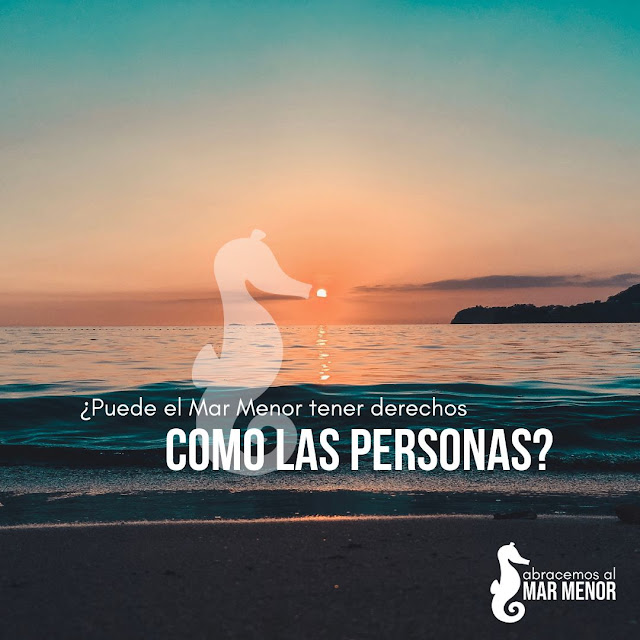
When the law is in “harmony with nature”.
In Spain, as in other countries in Europe and the world, we are facing great ecological and social risks that are a threat to our planet and to humanity, and the solutions to tackle the problem are not being effective. Ever since the 1992 Earth Summit launched the Convention on Biological Diversity, the Framework Convention on Climate Change and the Convention to Combat Desertification, the worsening of the planetary situation through biodiversity loss, global warming and increasing desertification, year after year, highlights the failure and ineffectiveness of this legal protection. The 2015 Paris Agreement has not succeeded in its objectives of preventing global temperature increases either, as evidenced by the diagnosis of the latest report of the Intergovernmental Panel on Climate Change (IPCC) 2021 Summary for Policymakers (Working Group I Contribution to the Sixth Assessment Report of the Intergovernmental).
The protection figures and regulatory instruments that have been put in place over the last twenty-five years to protect the Mar Menor have been insufficient and ineffective, although they have served to confirm the importance of the ecological value of the lagoon:
- International: recognition as a RAMSAR Wetland (Wetlands of International Importance, especially as a Habitat for Aquatic Birds), ZEPIM (Specially Protected Area of Mediterranean Importance. Barcelona Convention);
- European: Natura 2000 Network, SPA (Special Area of Conservation for Birds) and SAC (Special Areas of Conservation);
- National: Regional Park of the Salinas de San Pedro and Protected Landscape Open Spaces and Islands of the Mar Menor; Wildlife Protection Area.
The social movement that managed to surpass the minimum of 500,000 signatures required by the Popular Legislative Initiative recognised in the Spanish Constitution (article 87.3) in relation to Organic Law 3/1984, in a context of confinement due to the COVID pandemic, joins the most important social and legal movement of the 21st century in defence of the rights of Nature.
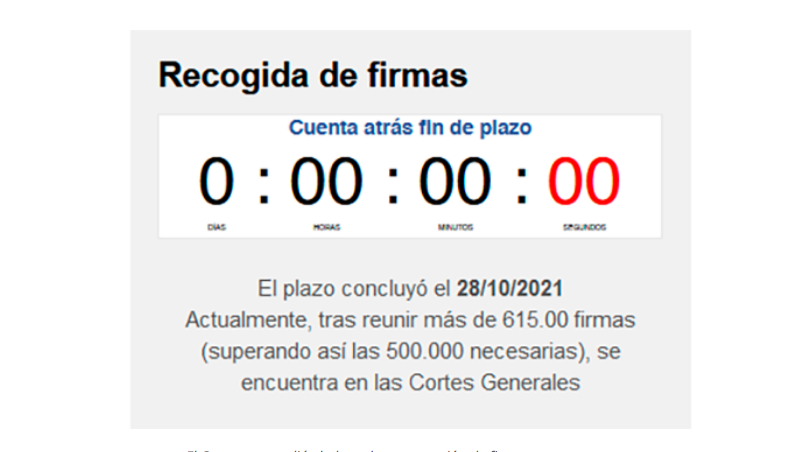
The Congress extended the deadline for submitting signatures for three more months, from 28 October 2021 to 28 January 2022. The extension deadline was not used, as the petitions with more than the required 500,000 signatures (more than 615,000) were submitted on 27 October 2021.
The legislative initiative to grant rights to the Mar Menor has been included in the tenth report of the United Nations Secretary General on Harmony with Nature (A/75/266). This latest report of 28 July 2020 states: “Recognising Nature as a subject of rights stands in stark contrast to current environmental protection laws, which are anthropocentric”. “One of the fundamental reasons why environmental law is not effective in protecting nature is the fact that it has never replaced the idea of unlimited exploitation of the planet, promoted by modern private law, with the concept of sustainability”. “In the last 50 years, despite the growing recognition that human rights are interlinked with the environment in which we live, most environmental laws have failed to reduce pollution and prevent the loss of species and habitats on which human beings depend”. “The recognition of Nature’s rights in law fills this gap and complements human rights.
Recognition of the rights of Nature is an international mandate. The General Assembly’s implementation of the Harmony with Nature Programme puts special emphasis on advancing new legal tools and concepts such as Earth Jurisprudence and the Ecological Imperative, with the aim of creating an Earth justice system that recognises and protects the rights of the Earth and all its species as a living reality, further demonstrating the commitment to a paradigm shift from a human-centered to an Earth-centered society in the implementation of the 2030 Agenda for Sustainable Development.
If rice had rights
The rights of nature are already a reality in several legal systems around the world, it is part of the international legal vanguard and the process is unstoppable. On different continents, there are examples of the recognition of rights for ecologically valuable and endangered ecosystems. In the 21st century, several countries have recognised the Rights of Nature (RoN) in their legal or jurisprudential frameworks. In the United States, more than 30 towns in the states of Pennsylvania, Ohio, Wisconsin, Oklahoma, Oregon, California, Virginia, New Hampshire, Maine, Florida and Maryland have passed laws that give local communities and ecosystems legal standing and individuals the right to defend them in court, the approach being based on the idea that individuals can defend ecosystem rights.
In Canada, the Magpie River in Quebec has legal personality. In North America, the Ojibwe people, one of the largest tribes of Native American peoples living in the United States and Canada, have recognised the rights of the White Earth wild rice, “because it has become necessary to provide a legal basis for protecting wild rice and freshwater resources as part of our primary treaty for future generations”. The rights of Manoomin or wild rice follow the model of the rights of nature adopted internationally in recent decades: “it possesses inherent rights to exist, flourish, regenerate and evolve, as well as inherent rights to restoration, recovery and preservation”.
The indigenous people of the Yurok have also recognised the legal personality and inherent rights of the Klamth River, which flows through Oregon and California to the Pacific. In South America, Ecuador (Constitution of 2008; Vilcabamba River), Bolivia (Law on the Rights of Mother Earth of 21 December 2010, Law No. 071), Colombia (Atrato, Coelho, Combeina and Cocora Rivers, Colombian Amazon, Salamanca Island Park). In Oceania, in New Zealand (Whanganui River). In India (Ganges and Yamuna). In Africa (Uganda, in mid-2019, enshrined the rights of nature in the National Environment Act).
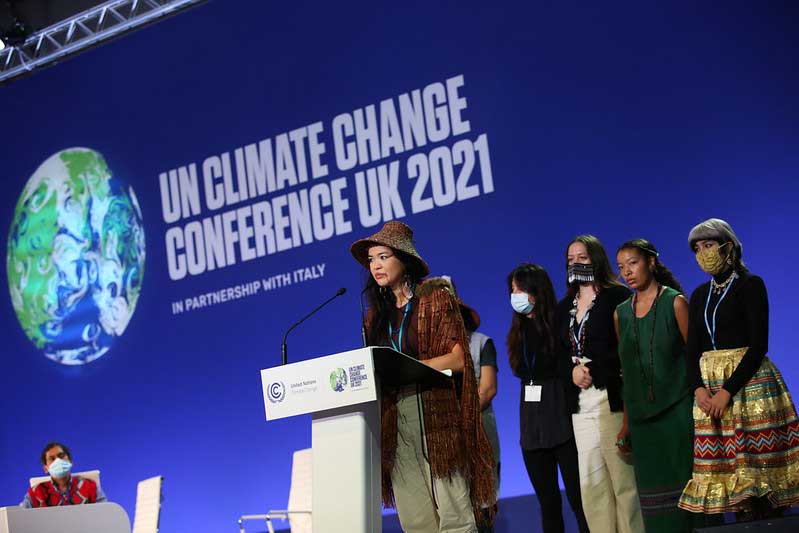
In Europe, the RoN [Rights of Nature] movement is more recent but has a growing interest among citizens and local representatives. Several initiatives stand out in Sweden, Northern Ireland, France (the Rhone River and the Tavignanu River in Corsica), Germany, the Netherlands, Denmark (North Sea, the Wadden Sea) and especially Spain, which is the most advanced, with the ILP of the Mar Menor.
In the European Union, although the majority of legal systems and modern environmental laws treat Nature as an object or a resource to be managed for human benefit, the Economic and Social Committee has a draft Charter of Fundamental Rights for Nature; and there is a proposal to announce before the European Parliament the initiatives underway in the different countries to recognise their own rights to their ecosystems, where the People’s Legislative Initiative for the Mar Menor will occupy an important place as the first ecosystem with its own rights in Europe. In this sense, the ILP of the Mar Menor has been the invited protagonist in the presentation on 2 February in Amsterdam of the compendium “Rights of Nature. Case-Studies From Six Continents”, an event organised by the Embassy of the Norh Sea.
COP. Arriving at the Summit… and looking on in disappointment
The rights of nature have been present at the last United Nations Summit COP 26 held in Glasgow, United Kingdom, forming part of the language and discourse of the group of Women for Climate Justice, GenderCC – Women for Climate Justice – the organisation with which I was nominated by the United Nations to participate in the Summit. The case for the ILP to recognise the rights of the Mar Menor was the subject of a special session at the COP 26 People’s Summit, the session took place on 9 November at the Glasgow Film Theatre.
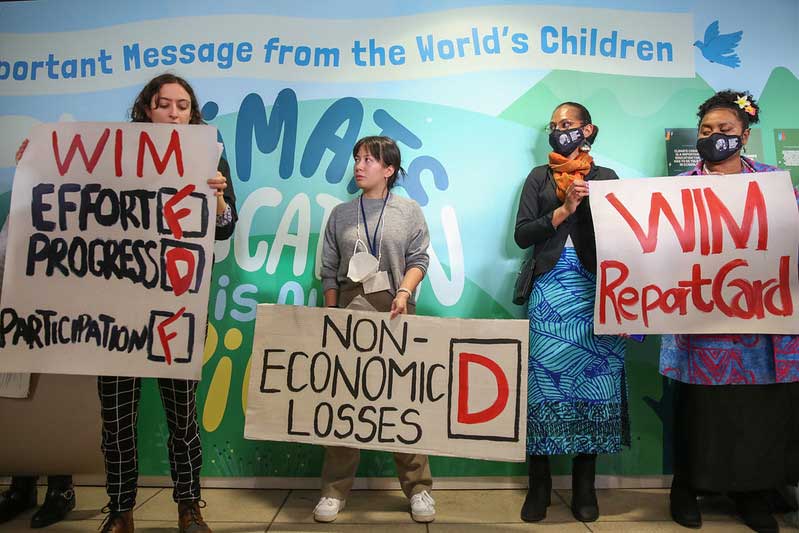
Attendees, during the COP26 in November 2021 UNFCCC_COP26_4Nov21_CivilSocietyActionsl_KiaraWorth-9
This year’s Climate Summit has closed with a new sense of failure on the part of scientists and civil society. The group GenderCC – Women for Climate Justice – has expressed its concern that this year’s COP has further excluded the voices of the most vulnerable people, with special reference to civil society from the Global South. Human and nature rights have been weakened in the face of corporate and market rights; on the issue of emissions trading, human rights were watered down, while the market believers got their way by introducing credits, which do not have to meet any sustainability and human rights criteria.
For Indigenous Peoples and frontline communities, this means facing climate disasters without adequate financial support, while their land rights are at risk of being affected by global carbon markets. You have also expressed concern about how nuclear power was advocated as a solution to the energy transition at COP26. And we strongly affirm that nuclear power is not green, that nuclear power is dangerous, expensive, leaves large amounts of radioactive waste, pollutes land and people, and violates human and indigenous rights. Uranium mining and milling consumes a lot of energy and generates large amounts of CO2 emissions. Women are more likely to suffer and die from radiation-induced cancer and have led the fight against nuclear power worldwide. Not to mention the interdependence between the civilian and military nuclear industries, which the crisis in Russia and Ukraine has brought home to us once again the risk of nuclear attack.
Legal personality. Real consequences of a fiction
The defence before the Spanish Parliament of the Mar Menor Popular Legislative Initiative is carried out within the framework of a social and participatory democracy, as recognised by the Spanish Constitution of 1978, in which citizens must be informed of the environmental issues that affect them and can participate in decision-making with respect to them, as guaranteed by the Aarhus Convention, to which Spain and the European Union are parties.
This Legislative Initiative defends the interests of the community, human and non-human, not only of the people affected, but also of the fish, crustaceans, plants, microbes and the different elements that make up and interact in the endangered lagoon ecosystem. Defending the Mar Menor’s own rights makes us think about what nature is (the center of life), what our nature is (biological rather than technological) and the relationship between humans and non-humans (a relationship of complementarity and interaction).
The ILP to recognise legal personality and its own rights for the Mar Menor lagoon and its basin falls within this new ecological paradigm of interdependence with nature. Legal personality is a fiction created by law in order to be able to grant rights to a natural entity for its defence and protection. It is a matter of advancing in equality and distribution of rights, which will no longer only be held by individuals, corporations or commercial entities, but also by nature, the ecosystems, as basic units of life on Earth. The fiction of legal personality and the rights of corporations and companies, which treat food as a product and nature as a mere object to maximise profits, must be limited by the recognition of the legal personality of ecosystems in order to stop the unrestrained exploitation of the natural environment and prevent the destruction of the ecological foundations of life.
“It is a question of making progress in equality and distribution of rights, which will no longer be held only by individuals, corporations or commercial entities.
The damage caused to the Mar Menor has to do with a development model based on the exploitation and domination of the lagoon and its basin without taking into account the adaptation to the times and the ecological needs of the ecosystem. The nitrate pollution of the Mar Menor, which is leading to its imminent collapse, after enduring since the 1960s an economic hypertrophy without environmental counterweights, is largely caused by the intensive agricultural and livestock activity installed in the Basin (400 hectares of intensive irrigation and 5800 head of pigs) in recent decades. Paradoxically, the model of intensive agriculture and livestock farming is used as an argument for “being able to feed people”, but a food system that destroys and pollutes nature cannot be a secure and sustainable food base.

Intensive agriculture and livestock farming in the Mar Menor basin has denatured the Cartagena countryside and has precipitated the collapse of the Mar Menor. The ecological tragedy of the Mar Menor and its basin has profoundly affected extensive livestock farming as the traditional livestock trails along which the transhumant herds of the Sierra del Segura used to move have disappeared, and the free movement of terrestrial fauna has been hindered. Livestock trails not only play a fundamental role in the connectivity of ecosystems, but also represent a reservoir of biodiversity, and could play an important role as natural barriers to retain water and sediments polluted by intensive agriculture, limiting their discharge into the Mar Menor. Industrial exploitation reduces the biodiversity found in agriculture (agrobiodiversity), in flora and fauna and wipes out pollinators and beneficial insects.
It also contributes to the greenhouse effect and causes climate change, as part of the greenhouse gas emissions come from the use of fossil fuels needed by the agricultural system to make fertilisers, move agricultural machinery and transport food thousands of kilometres, not to mention the huge source of methane which is another toxin responsible for global warming.
Another way of thinking, being and acting
What we are talking about with the proposal of rights for the Mar Menor and its basin is to defend an ecological paradigm of respect and adaptation to nature, to its times, cycles, diversity and needs, in order to be able to produce more and better food using fewer resources. The industrial paradigm conflicts with the ecological paradigm when it destroys nature. From the new ecological paradigm of the Popular Legislative Initiative in progress, the defence of the rights of the ecosystem of the Mar Menor to exist and evolve naturally, to recovery, protection, conservation, maintenance and restoration to allow the resilience of the Basin and the Lagoon is addressed. Restoring and renaturalising the Basin means recovering the natural characteristics of the Cartagena countryside, which also includes demarcating and recovering the 43 livestock trails.
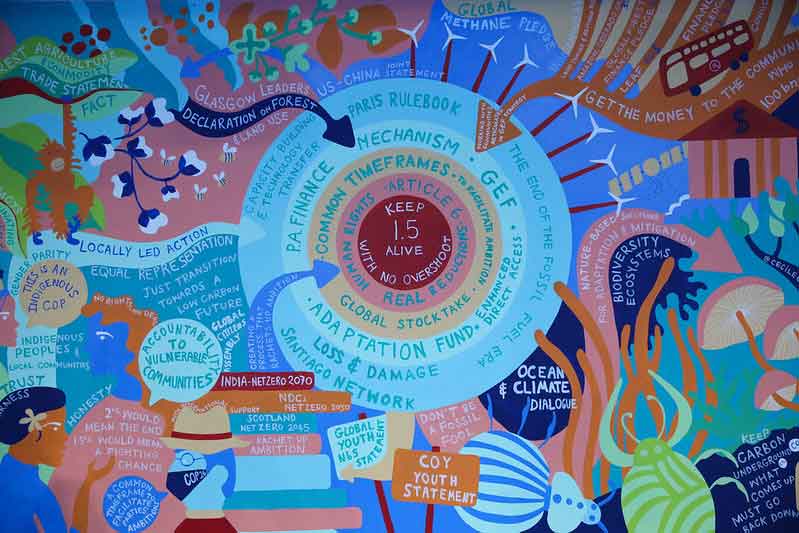
Both the new science of ecology, which developed in the last 20th century, and the new era of the Anthropocene that our planet is experiencing, highlight the ontological and epistemological error of considering human beings and culture as separate from nature, and promote a different rationality, cosmology, ontology and epistemology in Western thought from a new perspective that integrates Nature and Culture. The anthropocentric paradigm, the separation between Man and Nature, continues in the legal, political, economic and cultural spheres, because it is one of the invented and universalised bases (since the modern age) to guarantee the success of the hegemonic rationality of a certain economic logic that continues to dominate the world. Yet another way of thinking, being and acting is the basis for the rights of Nature: the interaction and systemic integrity of all forms of life.
“The ontological and epistemological error of considering human beings and culture as separate from nature is revealed.
From the field of law, recognising and remedying the error of anthropocentrism and evolving towards the new ecocentric conception means advancing from social justice (the greatest achievement of Western legal civilisation) towards ecological justice, which recognises the interaction of human beings with nature. The paradigm of Ecological Justice, the Jurisprudence of the Earth, or the Ecological Mandate offer the Theory of Law a new legal perspective in the context of the positivisation, interpretation and application of rights, beyond the generation of economic, social and cultural rights that gave birth to Social Justice, to advance in the recognition of a new generation of the rights of nature.
The recognition of rights of nature implies profound changes in the legal concepts of classical legal theory, such as the change from a legal relationship of reciprocity to a legal relationship of complementarity with the natural environment, and also the broadening of the spatial and temporal legal scopes of law to include future generations and the planetary implications of the ecosystem.
For an evolution of natural rights
The legal debate on the rights of nature is relatively recent in the Western world and began in the context of the burgeoning environmental movement in the 1970s in North America. In 1972, University of Southern California law professor Christopher D. Stone raised the possibility of nature having rights in its own right in a paper entitled Should Trees Have Standing, which opened a discussion on the legal rights of nature that reached the United States Supreme Court. Professor Stone was followed by others such as Roderick Nash, professor at the University of California (Santa Barbara) in 1984 published an article entitled Do Rocks Have Rights, where he found the foundation of Aldo Leopold’s ideas on the ethics of the Earth; and in 1989 he published his book “The Rights of Nature”, The Rights of Nature: A History of Environmental Ethics where he posits the extension of the rights of nature as the logical evolution of rights.
In the 21st century, the social and legal movement for the defence of the rights of nature is at the forefront internationally, and the ILP to recognise the legal personality of the Mar Menor Lagoon and its basin will make it the first ecosystem with its own rights in Europe. As underlined by the UN General Assembly on World Nature Day, it is very important to strengthen the ecological awareness of humanity and a key mechanism is education, primary, secondary and university. Teacher for Future plays a great role in the early stages with children and adolescents, but university education from the interdisciplinary field of science is also decisive in order to face the serious ecological and social crisis we are suffering with new models that recognise the value of nature and the Humanity-Earth interaction, and to advance with hope and efficiency towards a world in which all its inhabitants can share the right to live and develop in accordance with our own vital essence and in PEACE.


